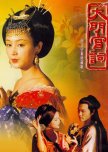Love's Nadir
Is art meant to be good or memorable?
I don’t know.
But I kept returning to that question multiple times while watching *Palace of Desire, *alternatively known as *Auteur on Steroids*.
The (in)famous Wu Ze Tian had one daughter, Princess Taiping, who is this show’s protagonist. We follow her from her teenage years until her death in a lifetime characterised by four failed loves and an intimate understanding of the limits of power. Her life and this story are a tragedy. Happiness is hard-won and then fleeting.
As the final credits rolled, I wondered about the characters being little better than the shadow puppets they often manipulated for entertainment, and if we were any better. How much control do we really have? It’s a testament to the power of the tale that I feel a tad sullied in describing the tragedy portrayed as Shakespearian. Its achievement not only compares to such Shakespearian sagas as Titus Andronicus and The Dark Knight, but it might well surpass them.
https://youtu.be/qTfnJuE1l98?si=VsvJRkE9MPrvbkSAMy praise for the show as a work of art is fulsome. The soundtrack is haunting, the costumes superb, and the directing style—which takes some getting used to—fits the atmosphere like a glove. I dare say that Chinese has never sounded so mellifluous—the shadow puppet tales should be unescoed or something.
Yet.
I’m not certain if this show is good. I’ve never been bothered by that question for a show I rated so highly before. Consider the actor, Wen Hsuan Chao. He plays two characters whose resemblance is a key part of the plot and drives Taiping’s maturity. Yet, to my mind, his portrayal of the noble, tragic figure of Xue Shao was mediocre. To be fair, the role of a man driven by honour and desire to act in a contradictory fashion was always likely to be difficult. I’d dismissed him as only being cast because he’s one of the handsomest blokes I’d ever seen. And his characters looks are very much part of the story. Yet, the same guy becomes a world-beater in his interpretation of the Machiavellian Don Juan, Zhang Yi Zhi. And that’s pretty much how it goes with most of the cast except for Gui Ya Lei (Wu Ze Tian) and Zhou Xun (Young Princess Taiping).
Parts of the story struck me as needlessly contrived or handwavy too. And, yet, everything came together in a way that works! I might even rewatch it! And that’s rare for me.!
I don’t know.
But I kept returning to that question multiple times while watching *Palace of Desire, *alternatively known as *Auteur on Steroids*.
The (in)famous Wu Ze Tian had one daughter, Princess Taiping, who is this show’s protagonist. We follow her from her teenage years until her death in a lifetime characterised by four failed loves and an intimate understanding of the limits of power. Her life and this story are a tragedy. Happiness is hard-won and then fleeting.
As the final credits rolled, I wondered about the characters being little better than the shadow puppets they often manipulated for entertainment, and if we were any better. How much control do we really have? It’s a testament to the power of the tale that I feel a tad sullied in describing the tragedy portrayed as Shakespearian. Its achievement not only compares to such Shakespearian sagas as Titus Andronicus and The Dark Knight, but it might well surpass them.
https://youtu.be/qTfnJuE1l98?si=VsvJRkE9MPrvbkSAMy praise for the show as a work of art is fulsome. The soundtrack is haunting, the costumes superb, and the directing style—which takes some getting used to—fits the atmosphere like a glove. I dare say that Chinese has never sounded so mellifluous—the shadow puppet tales should be unescoed or something.
Yet.
I’m not certain if this show is good. I’ve never been bothered by that question for a show I rated so highly before. Consider the actor, Wen Hsuan Chao. He plays two characters whose resemblance is a key part of the plot and drives Taiping’s maturity. Yet, to my mind, his portrayal of the noble, tragic figure of Xue Shao was mediocre. To be fair, the role of a man driven by honour and desire to act in a contradictory fashion was always likely to be difficult. I’d dismissed him as only being cast because he’s one of the handsomest blokes I’d ever seen. And his characters looks are very much part of the story. Yet, the same guy becomes a world-beater in his interpretation of the Machiavellian Don Juan, Zhang Yi Zhi. And that’s pretty much how it goes with most of the cast except for Gui Ya Lei (Wu Ze Tian) and Zhou Xun (Young Princess Taiping).
Parts of the story struck me as needlessly contrived or handwavy too. And, yet, everything came together in a way that works! I might even rewatch it! And that’s rare for me.!
Esta resenha foi útil para você?







